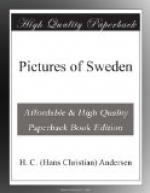We came hither from Gefle, and saw at a great distance on the way, the blue clouds from the broken, rising spray, ascend above the dark-green tops of the trees. The carriage stopped near the bridge; we stepped out, and close before us fell the whole redundant elv.
The painter cannot give us the true, living image of a waterfall on canvas—the movement is wanting; how can one describe it in words, delineate this majestic grandeur, brilliancy of colour, and arrowy flight? One cannot do it; one may however attempt it; get together, by little and little, with words, an outline of that mirrored image which our eye gave us, and which even the strongest remembrance can only retain—if not vaguely, dubiously.
The Dal-elv divides itself into three branches above the fall: the two enclose a wood-grown rocky island, and rush down round its smooth-worn stony wall. The one to the right of these two falls is the finer; the third branch makes a circuit, and comes again to the main stream, close outside the united fall; here it dashes out as if to meet or stop the others, and is now hurried along in boiling eddies with the arrowy stream, which rushes on foaming against the walled pillars that bear the bridge, as if it would tear them away along with it.
The landscape to the left was enlivened by a herd of goats, that were browsing amongst the hazel bushes. They ventured quite out to the very edge of the declivity, as they were bred here and accustomed to the hollow, thundering rumble of the water. To the right, a flock of screaming birds flew over the magnificent oaks. Cars, each with one horse, and with the driver standing upright in it, the reins in his hand, came on the broad forest road from Oens Brueck.
Thither we will go in order to take leave of the Dal-elv at one of the most delightful of places, which vividly removes the stranger, as it were, into a far more southern land, into a far richer nature, than he supposed was to be found here. The road is so pretty—the oak grows here so strong and vigorously with mighty crowns of rich foliage.
Oens Brueck lies in a delightfully pastoral situation. We came thither; here was life and bustle indeed! The mill-wheels went round; large beams were sawn through; the iron forged on the anvil, and all by water-power. The houses of the workmen form a whole town: it is a long street with red-painted wooden houses, under picturesque oaks, and birch trees. The greensward was as soft as velvet to look at, and up at the manor-house, which rises in front of the garden like a little palace, there was, in the rooms and saloon, everything that the English call comfort.
We did not find the host at home; but hospitality is always the house-fairy here. We had everything good and homely. Fish and wild fowl were placed before us, steaming and fragrant, and almost as quickly as in beautiful enchanted palaces. The garden itself was a piece of enchantment. Here stood three transplanted beech-trees, and they throve well. The sharp north wind had rounded off the tops of the wild chesnut-trees of the avenue in a singular manner: they looked as if they had been under the gardener’s shears. Golden-yellow oranges hung in the conservatory; the splendid southern exotics had to-day got the windows half open, so that the artificial warmth met the fresh, warm, sunny air of the northern summer.




